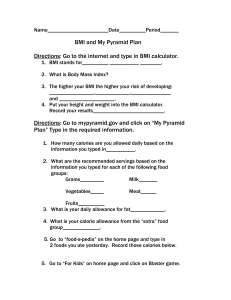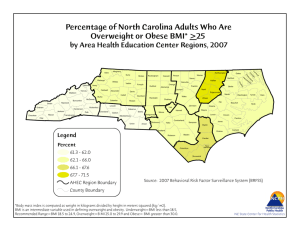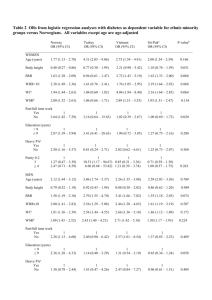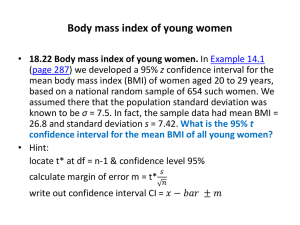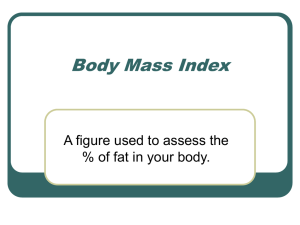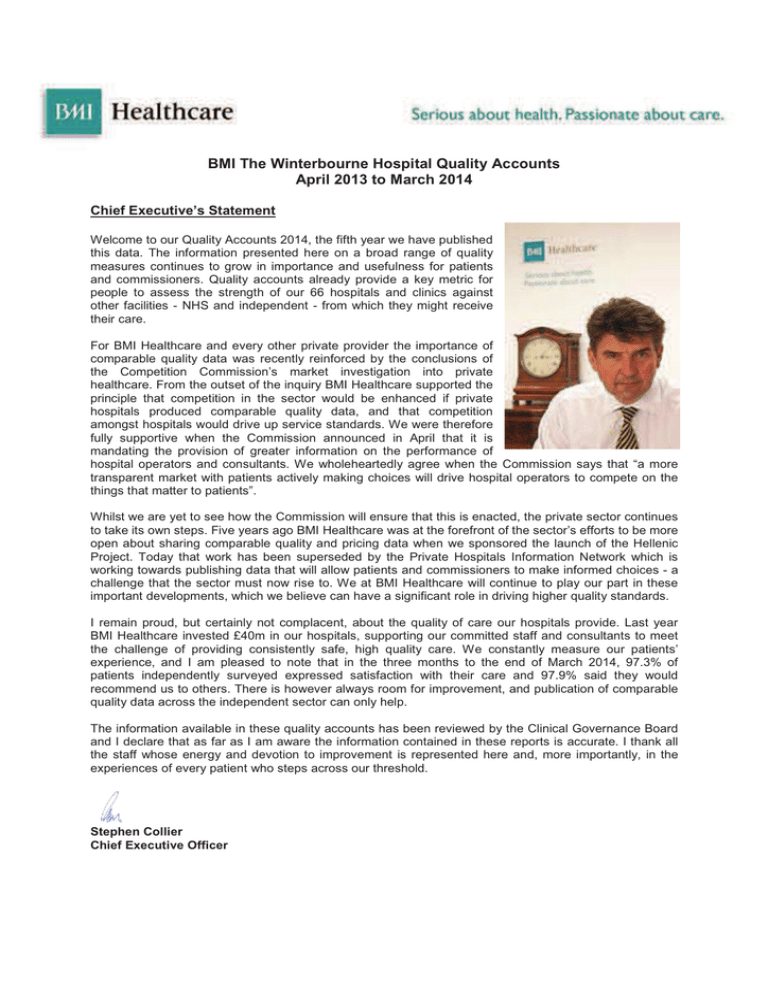
BMI The Winterbourne Hospital Quality Accounts
April 2013 to March 2014
Chief Executive’s Statement
Welcome to our Quality Accounts 2014, the fifth year we have published
this data. The information presented here on a broad range of quality
measures continues to grow in importance and usefulness for patients
and commissioners. Quality accounts already provide a key metric for
people to assess the strength of our 66 hospitals and clinics against
other facilities - NHS and independent - from which they might receive
their care.
For BMI Healthcare and every other private provider the importance of
comparable quality data was recently reinforced by the conclusions of
the Competition Commission’s market investigation into private
healthcare. From the outset of the inquiry BMI Healthcare supported the
principle that competition in the sector would be enhanced if private
hospitals produced comparable quality data, and that competition
amongst hospitals would drive up service standards. We were therefore
fully supportive when the Commission announced in April that it is
mandating the provision of greater information on the performance of
hospital operators and consultants. We wholeheartedly agree when the Commission says that “a more
transparent market with patients actively making choices will drive hospital operators to compete on the
things that matter to patients”.
Whilst we are yet to see how the Commission will ensure that this is enacted, the private sector continues
to take its own steps. Five years ago BMI Healthcare was at the forefront of the sector’s efforts to be more
open about sharing comparable quality and pricing data when we sponsored the launch of the Hellenic
Project. Today that work has been superseded by the Private Hospitals Information Network which is
working towards publishing data that will allow patients and commissioners to make informed choices - a
challenge that the sector must now rise to. We at BMI Healthcare will continue to play our part in these
important developments, which we believe can have a significant role in driving higher quality standards.
I remain proud, but certainly not complacent, about the quality of care our hospitals provide. Last year
BMI Healthcare invested £40m in our hospitals, supporting our committed staff and consultants to meet
the challenge of providing consistently safe, high quality care. We constantly measure our patients’
experience, and I am pleased to note that in the three months to the end of March 2014, 97.3% of
patients independently surveyed expressed satisfaction with their care and 97.9% said they would
recommend us to others. There is however always room for improvement, and publication of comparable
quality data across the independent sector can only help.
The information available in these quality accounts has been reviewed by the Clinical Governance Board
and I declare that as far as I am aware the information contained in these reports is accurate. I thank all
the staff whose energy and devotion to improvement is represented here and, more importantly, in the
experiences of every patient who steps across our threshold.
Stephen Collier
Chief Executive Officer
Hospital Information
BMI, The Winterbourne Hospital (WBH), in Dorchester, Dorset has 38 beds offering the privacy
and comfort of en-suite facilities, satellite TV, telephone and WiFi. The hospital has two
operating theatres, physiotherapy with a hydrotherapy pool, diagnostic imaging department and
a new 2 bedded High Dependency Unit (HDU).
Our consultants are supported by caring and professional medical staff, including highly
qualified nursing teams and Resident Medical Officers 24 hours a day, ensuring the highest
quality care in a friendly and comfortable environment.
In the past year significant investment has been made to update and refurbish the patient rooms
and Out Patient area. During 2013 the Hospital has continued to use new technologies in the
treatment of prostate cancers and prostatic hyperplasia. A new outpatient one stop varicose
vein clinic has also been launched. BMI, The Winterbourne Hospital continues to participate in
the Choice Network for NHS patients offering a range of services for patients to choose their
hospital and surgeon. NHS patients accounted for 29% of the overall caseload at WBH in 2013.
BMI Healthcare is registered as a provider with the Care Quality Commission (CQC) under the
Health & Social Care Act 2008. BMI, The Winterbourne Hospital is registered as a location for
the following regulated services:•
•
•
•
Treatment of disease, disorder and injury
Surgical procedures
Diagnostic and screening
Fertility
The CQC carried out an unannounced inspection on 19th November 2013 and again on 8th
January 2014 and in January found :
Care and welfare of people who use services
Meeting nutritional needs
Supporting workers
Complaints
BMI, The Winterbourne Hospital has a local framework through which clinical effectiveness,
clinical incidents and clinical quality is monitored and analysed. Where appropriate, action is
taken to continuously improve the quality of care. This is through the work of a multidisciplinary
group and the Medical Advisory Committee.
Regional Clinical Quality Assurance Groups monitor and analyze trends and ensure that the
quality improvements are operationalized. There has been development of
At corporate level the Clinical Governance Board has an overview and provides the strategic
leadership for corporate learning and quality improvement.
There has been ongoing focus on robust reporting of all incidents, near misses and outcomes.
Data quality has been improved by ongoing training and database improvements. New reporting
modules have increased the speed at which reports are available and the range of fields for
analysis. This ensures the availability of information for effective clinical governance with
implementation of appropriate actions to prevent recurrences in order to improve quality and
safety for patients, visitors and staff.
At present we provide full, standardised information to the NHS, including coding of procedures,
diagnoses and co-morbidities and PROMs for NHS patients.There are additional external
reporting requirements for CQC, Public Health England (Previously HPA) CCGs and Insurers
BMI is a founding member of the Private Healthcare Information Network (PHIN) UK – where
we produce a data set of all patient episodes approaching HES-equivalency and submit this to
PHIN for publication. The data is made available to common standards for inclusion in
comparative metrics, and is published on the PHIN website http://www.phin.org.uk. This website
gives patients information to help them choose or find out more about an independent hospital
including the ability to search by location and procedure.
1. Safety
1.1 Infection prevention and control
The focus on Infection Prevention and control (IPC) continues
under the leadership of the Group Director of Infection Prevention
and Control and Group Head of Infection Prevention and Control, in
liaison with the Infection Prevention and Control Lead BMI, The
Winterbourne Hospital.
We have had: • Zero cases of MRSA bacteraemia in the last year (NHS 1.17cases/100,000 bed days).
• Zero MSSA bacteraemia cases /100,000 bed days
• Zero E.coli bacteraemia cases/ 100,000 bed days
• No cases of hospital apportioned Clostridium difficile in the last 12 months.
• SSI data is also collected and submitted to Public Health England for orthopaedic
surgical procedures. Our rates of infection are;
o Hips
0 cases
o Knees
0 cases
Regular monthly IPC audits are carried out to ensure compliance with national and local IPC
standards. Hand hygiene remains high on the clinical agenda as a means of continuously
improving IPC standards and safeguarding our patients and visitors. Significant improvement in
hand gel use was demonstrated in the most recent audit, particularly during the transfer of
patients (in beds) from one department to another.
High Impact Intervention Care Bundles are also regularly audited and include, Peripheral
Cannula care, Urinary Catheter Care and Surgical Site Infections (SSI). The audit results for
SSI show 100% compliance with relevant NHS and BMI policies within both the theatre
environment and post-surgical care on the ward with, for example, no surgical wound dressings
being removed within the standard 48 hours post-operatively. The results for both Peripheral
Cannula Care and Urinary Catheter care also show a very high level of compliance at 100%.
Hand hygiene surveillance is carried out on a monthly basis in different clinical areas of the
hospital. The areas in which nursing staff practice have been clearly demonstrated to be
delivering a high level of compliance and there is a focus on this audit within other clinical areas
in order to demonstrate our commitment to IPC standards. Aseptic Non-Touch Technique has
become an increasingly important aspect of surgical wound care and as a direct result and in
order to ensure compliance with up-to-date, evidence based practice, nursing staff are enrolled
on the Corporate education and training programme. Compulsory Mandatory training sessions
continue to provide the rationale for rigorous attention to hand washing and the significant
improvements are demonstrated in the audited results.
Environmental cleanliness is also an important factor in infection prevention and our patients
rate the cleanliness of our facilities highly. The most recent results of Patient Satisfaction with
the cleanliness of the environment are illustrated in the graph below.
1.2 Patient Led Assessment of the Care Environment (PLACE)
We believe a patient should be cared for with compassion and dignity in a clean, safe environment.
Where standards fall short, they should be able to draw it to the attention of managers and hold the
service to account. PLACE assessments will provide motivation for improvement by providing a clear
message, directly from patients, about how the environment or services might be enhanced.
In 2013 we introduced PLACE, which is the new system for assessing the quality of the patient
environment, replacing the old Patient Environment Action Team (PEAT) inspections.
The assessments involve patients and staff who assess the hospital and how the environment
supports patient’s privacy and dignity, food, cleanliness and general building maintenance. It focuses
entirely on the care environment and does not cover clinical care provision or how well staff are
doing their job.
The results will show how hospitals are performing nationally and locally. Results of the hospital for
2013 showed the need to make improvements in specific areas such as ‘food and hydration’. The
practice was for cool drinking water being provided by Servery staff to patients post-operatively has
been changed to improve the level clinical care provided and ensure that for at least 24 hours postoperatively patient hydration is monitored closely by clinical staff and is not the responsibility of nonclinical staff.
To further support this work it is intended to establish a Patient Focus Group that will comprise key
members of the hospital staff together with former patients who will have experience of the hospital.
The aim of the group will be to maximize the opportunities to improve the patient experience within
the hospital environment and be truly reflective of the patient perspective.
1.3 Venous Thrombo-embolism (VTE)
BMI Healthcare, holds VTE Exemplar Centre status by the Department of Health across its
whole network of hospitals including, BMI The Winterbourne Hospital. BMI Healthcare was
awarded the Best VTE Education Initiative Award category by Lifeblood in February 2013 and
were the Runners up in the Best VTE Patient Information category.
We see this as an important initiative to further assure patient safety and care. We audit our
compliance with our requirement to VTE risk assessment every patient who is admitted to our
facility and the results of our audit on this has shown 100% compliance for all surgical and
medical patients (excluding those patients undergoing cataract surgery unless presenting with
identified risk factors). The current screening process carried out by our pre-operative
assessment nurse aims to maintain this standard of compliance by ensuring up-to-date practice
is delivered to all relevant patients.
BMI The Winterbourne Hospital reports the incidence of Venous Thromboembolism (VTE)
through the corporate clinical incident system. It is acknowledged that the challenge is receiving
information for patients who may return to their GPs or other hospitals for diagnosis and/or
treatment of VTE post discharge from the Hospital. As such we may not be made aware of
them. We continue to work with our Consultants and referrers in order to ensure that we have
as much data as possible.
During the last year the hospital has had no incidences of Deep Vein Thrombosis. This, we
believe, to be a direct result of vigilant screening of our patients and the incidence rate is well
below the national average.
During the last year there has been one identified and confirmed case of post-operative
Pulmonary Embolus (PE) in a patient with known risk factors for VTE. With prompt identification
and treatment this patient is making a full recovery. Increased knowledge and skill in early
intervention has greatly improved the incidence of PE at the hospital.
W;ZĂƚĞƉĞƌϭϬϬĂĚŵŝƐƐŝŽŶƐͿ
Ϭ͘Ϭϯϱ
Ϭ͘ϬϮϴϵ
Ϭ͘ϬϯϬ
Ϭ͘ϬϮϲϵ
Ϭ͘ϬϮϲϮ
Ϭ͘ϬϮϱ
ϮϬϬϵ
ϮϬϭϬ
Ϭ͘ϬϮϬ
ϮϬϭϭ
Ϭ͘Ϭϭϱ
ϮϬϭϮ
ϮϬϭϯ
Ϭ͘ϬϭϬ
ϮϬϭϰ
Ϭ͘ϬϬϬϬ
Ϭ͘ϬϬϬϬ
ϮϬϭϯ
Ϭ͘ϬϬϬϬ
ϮϬϭϮ
Ϭ͘ϬϬϱ
ϮϬϭϰ
ϮϬϭϭ
ϮϬϭϬ
ϮϬϬϵ
Ϭ͘ϬϬϬ
2. Effectiveness
2.1 Patient reported Outcomes (PROMS)
Patient Reported Outcome Measures (PROMs) are a means of collecting information on the
effectiveness of care delivered to NHS patients as perceived by the patients themselves.
PROMs is a Department of Health led programme.
Latest results can be found by going on the online SOLAR system provided to you by Quality
Health
Please note that the data provided by HSCIC did not give any data in terms of Varicose Veins
and therefore none can be reported.
Please also note that there were no scores for Varicose Veins for BMI Healthcare and therefore
hospitals can’t be scored for this.
For the current reporting period, the tables below demonstrate that the health gain between
Questionnaire 1 (pre-operative) and Questionnaire 2 (post–operative) for patients undergoing
hip replacement and knee replacement at BMI The Winterbourne Hospital. The latest results for
April to December 2013 were published in May 2014. Although BMI The Winterbourne Hospital
participates in PROMS, we do not have sufficient volumes for these procedures for our
individual data to be captured. Therefore there is no published data for our hospital in relation
to hip and knee replacements for NHS patients.
Oxford Hip Score average
2012
Q1
Q2
Health gain (Q2 - Q1 average)
Hospital
20.533
42.8
22.267
England
0.339
0.767
0.429
Copyright © 2011 Re-used with the permission of The Health and Social Care Information Centre. All rights reserved.'
Oxford Knee Score average
2011/2012
Q1
Q2
Health gain (Q2 - Q1 average)
Hospital
20.879
37.939
17.061
England
0.387
0.709
0.321
Copyright © 2013, The Health and Social Care Information Centre. All Rights Reserved.
2.2 Enhanced Recovery Programme (ERP)
The ERP is about improving patient outcomes and speeding up a patient’s recovery after
surgery. ERP focuses on making sure patients are active participants in their own recovery and
always receive evidence based care at the right time. It is often referred to as rapid recovery, is
a new, evidence-based model of care that creates fitter patients who recover faster from major
surgery. It is the modern way for treating patients where day surgery is not appropriate. BMI The
Winterbourne Hospital has achieved and maintained a high degree of compliance with ERP and
has been consistently above the national average in meeting the requirements of ERP for our
patients.
ERP is based on the following principles:1. All Patients are on a pathway of care
a. Following best practice models of evidenced based care
b. Reduced length of stay
2. Patient Preparation
a. Pre Admission assessment undertaken
b. Group and/or individual Education sessions
c. Optimizing the patient prior to admission – i.e Haemoglobin (Hb) optimisation,
control co-morbidities, medication assessment – stopping medication plan.
d. Commencement of discharge planning
3. Proactive patient management
a. Maintaining good pre-operative hydration
b. Minimising the risk of post-operative nausea and vomiting
c. Maintaining normothermia peri- operatively
d. Early mobilisation
4. Encouraging patients have an active role in their recovery
a. Participate in the decision making process prior to surgery
b. Education of patient and family
c. Setting own goals daily
d. Active participation in their discharge planning that starts at the pre-admission
stage
Over the past 12 months, The Winterbourne Hospital has continued to focus on ERP for
patients undergoing Hip Replacement or Knee Replacement surgery. We have an ERP
steering group comprising members of the multidisciplinary team and have achieved a
significant reduction in length of stay for patients undergoing these procedures, whilst
maintaining optimal care and rehabilitation.
2.3 Unplanned Readmissions within 31 days and unplanned returns to theatre.
Unplanned readmissions and unplanned returns to theatre are normally due to a clinical
complication related to the original surgery.
hŶƉůĂŶŶĞĚZĞĂĚŵŝƐƐŝŽŶǁŝƚŚŝŶϯϭĚĂLJƐ;ZĂƚĞ
ƉĞƌϭϬϬŝƐĐŚĂƌŐĞƐͿ
Ϭ͘ϴϬϬ
Ϭ͘ϲϵϯϰ
Ϭ͘ϳϬϬ
Ϭ͘ϲϬϬ
ϮϬϬϵ
Ϭ͘ϱϭϮϳ
Ϭ͘ϱϬϬ
ϮϬϭϬ
Ϭ͘ϰϬϬ
ϮϬϭϭ
Ϭ͘ϯϬϬ
ϮϬϭϮ
Ϭ͘ϭϳϮϭ
Ϭ͘ϮϬϬ
Ϭ͘ϭϴϳϲ
ϮϬϭϯ
Ϭ͘ϭϯϬϵ
Ϭ͘ϬϴϬϴ
Ϭ͘ϭϬϬ
ϮϬϭϰ
ϮϬϭϰ
ϮϬϭϯ
ϮϬϭϮ
ϮϬϭϭ
ϮϬϭϬ
ϮϬϬϵ
Ϭ͘ϬϬϬ
3. Patient experience
3.1 Patient satisfaction
BMI Healthcare is committed to providing the highest levels of quality of care to all of our
patients. We continually monitor how we are performing by asking patients to complete a patient
satisfaction questionnaire. Patient satisfaction surveys are administered by an independent third
party.
Category
Admission process
Nursing care
Accommodation
Catering
Discharge process
Overall Quality of Care
% Excellent
March 2013
March 2014
73.1
73.6
72.4
85.9
80.0
79.1
60.0
77.0
66.0
62.9
76.4
92.7
% Good
March 2013
March 2014
88.5
94.4
93.1
100
96.0
97.0
90.0
95.1
88.7
97.2
98.2
98.2
The admissions process for patients forms an important aspect of their overall experience. We
have the patient’s named nurse meet and greet them on arrival in the hospital and take them
through to their individual room. We believe this will reduce the level of anxiety for our patients
and ensures they know who their named nurse is from the moment they arrive. The emphasis
at BMI The Winterbourne Hospital is quality of care and we firmly believe that this initiative is a
good platform from which to continue the improvement process.
The quality and standard of nursing care has been driven up over recent months by ensuring
that all nursing staff, including Health Care Assistants are fully engaged in the delivery of care,
have regular professional appraisals and a personal development plan. There is a greater
emphasis at BMI The Winterbourne Hospital on ‘growing’ our own staff and we believe that fully
engaging with our nursing staff, valuing their unique contribution to the delivery of care and
supporting their on-going professional development is key to having achieved, and being able to
maintain these continuous improvements in patient care. The results in the above table provide
a good indication of overall improvements in the delivery of nursing care that is of a consistently
high quality.
A ‘rolling programme’ of room refurbishment is currently underway to improve the individual
patient rooms. Whilst this will take some time to complete we are confident that patient
satisfaction in this area will continue to improve. Projects that have been undertaken include a
refurbishment of the Outpatient Department Nursing Office. This has been opened up and now
provides our patients and the Consultants with instant access to assistance from either nursing
or administrative staff, depending on their requirement. There remains a strong commitment to a
continuous programme of upgrading and refurbishment that will improve the standard of
accommodation in all patient areas.
3.2 Complaints
In addition to providing all patients with an opportunity to complete a satisfaction survey BMI
The Winterbourne Hospital actively encourages feedback both informally and formally. Patients
are supported through a robust complaints procedure, operated over three stages:
Stage 1: Hospital resolution
Stage 2: Corporate resolution
Stage 3: Patients can refer their complaint to independent adjudication if they are not satisfied
with the outcome at the other 2 stages.
Where appropriate, the Executive Director and Director for Clinical Services meet with patients
to ensure that a complete picture of the patient experience is achieved. This process allows for
individual and group reflection on incidents and complaints and contributes to the improvement
goals for the hospital. From 2012 through 2013 and in to 2014 there has been a downward
trend in the number of patient complaints, particularly those relating to direct patient care. We
firmly believe that the initiatives and improvements made so far have had a significant positive
impact on patient care. Improvement plans will continue to improve the service and, we believe,
reduce the number of adverse incidents and patient complaints.
Audit results show that 100% of complaints received an initial response within 48 hours of
receipt and 100% receiving a full response within the required 20 days.
Since the last quarter of 2013 the general trend for complaints has been downward. Patient
complaints in relation to direct nursing care have reduced significantly and is reflective of
reported improvements in Patient Satisfaction with nursing care in general. Complaints relating
to fees remain an issue that is being addressed with improved communication, both written and
verbal when patients are making enquiries about treatment.
4. CQUINS
Commissioning for Quality and Innovation is an NHS led programme offering additional
funding to improve quality and encourage innovation. The NHS mandates national CQUINS
and negotiates a local level for further CQUINS. For the 2013/14 year the National measures
were:
•
VTE Risk Assessment
• Patient Experience
• Safety Thermometer returns
BMI The Winterbourne met all targets for these measures.
Locally agreed CQUINS were:
• Pain Management ( requiring that all patients must have
documented pain scores with all observations)
• Dementia Care and onward referral
• Smoking Cessation (requiring onward referral to Smoke Stop
Clinic for those patients who consented)
BMI The Winterbourne Hospital has also met all of these targets.
For the 2013/14 year, The Friends and Family Test – a question which asks all patients
and staff if they would recommend the service to their family and friends – has been
added to the National CQUINS. Dementia Screening
Last years’ agreed local CQUINS have been incorporated in clinical quality requirements
and remain part of practice and new ones have been added: audits of all care bundles
for indwelling catheters and post-surgical remote follow up - that is a documented call to
patients post discharge to check on their wellbeing and progress.
5. National Clinical Audits
BMI The Winterbourne Hospital was only eligible to participate in National Joint Registry
audit and all joint replacements are submitted to this. BMI hospital data is from page 196
onwards in attached latest NJS report. Use this if appropriate with your narrative on the
data and any improvement plans.
6. Research
No NHS patients were recruited to take part in research.
7. Priorities for service development and improvement
In 2014/2015 has focused on developments to improve the following services:
1. Expansion of the spinal services with the appointment of a Spinal Nurse Specialist
who, working closely with our Spinal Surgeon, will greatly improve the pre and postoperative care for spinal surgical patients.
2. Development of High Dependency Care which will allow for more complex surgical
patients to be safely cared for post-operatively.
3. Development and expansion of Cancer treatment services
4.
8. Mandatory Quality Indicators
8.1 The value and banding of the summary hospital-level mortality indicator (SHMI) for the
(BMI The Winterbourne) for the reporting period.
NOTE: Point 8.1 & 8.3 included in the Quality Accounts cannot currently be
compared to national data sets – these are SHMI (as the HSCIC data does not
contain the independent sector for this), and also re-admissions above & below 15
years old. Currently data collected does not distinguish re-admissions by age
within Sentinel Incident reporting system. Therefore BMI Healthcare cannot
accurately compare the figures. In addition at BMI The Winterbourne Hospital no
patients are admitted below 16 years of age.
Unit
Value
and
Banding
Reporting Periods
(at least last two
reporting periods)
Oct 11 – Jun 13
National
Average
Highest National
Score
Lowest National
Score
1.0006
1.1822
0.6735
8.2 The (BMI The Winterbourne’s) patient reported outcome measures scores for
(i) Groin hernia surgery
Unit
*
Reporting Periods
(at least last two
reporting periods)
Apr 12 – Mar 13
National
Average
Highest National
Score
Lowest National
Score
0.083
0.157
0.014
* = less than 30 patients going through the process, meaning that the site cannot be
scored. SECTION N/A
(ii) Varicose vein surgery
Please also note that there were no scores for Varicose Veins for BMI Healthcare and
therefore hospitals can’t be scored for this.
Unit
Reporting Periods
(at least last two
reporting periods)
Apr 12 – Mar 13
(iii) Hip replacement surgery
National
Average
Highest National
Score
Lowest National
Score
-8.738
8.172
-15.918
Unit
23.238
Reporting Periods
(at least last two
reporting periods)
Apr 12 – Mar 13
National
Average
Highest National
Score
Lowest National
Score
21.280
24.684
17.214
BMI The Winterbourne hospital considers that this data is as described for the following
reasons: patients receive information regarding their surgery, and ERP and its relevance
to their recovery, at the time of being listed by the Consultant. This is then reinforced,
firstly at pre-operative assessment and at pre-operative physiotherapy lesson and,
subsequently, in to the post-operative phase of their journey. This results in patients
being fully aware and able to provide fully informed consent for their operation and the
post-operative course for recovery.
BMI The Winterbourne hospital intends to continue with the current programme,
particularly ERP and information giving to ensure that patients are fully informed and the
information they receive, as well as the care, has a positive impact on their recovery.
(iv) Knee replacement surgery during the reporting period.
Unit
17.441
Reporting Periods
(at least last two
reporting periods)
Apr 12 – Mar 13
National
Average
Highest National
Score
Lowest National
Score
15.99
20.37
12.2
BMI The Winterbourne considers that this data is as described for the following reasons:
The percentage of patients responding is lower than for hip replacements and we intend
to create greater awareness of PROMs amongst this patient group and increase the
percentage response rate. ERP is extended to this patient group and it is intended to
focus on information giving to ensure an increase in the quality of care reported.
8.3 (i) The percentage of patients aged 0-14 readmitted to a hospital which forms part of
the (BMI The Winterbourne) within 28 days of being discharged from a hospital which
forms part of the hospital during the reporting period.
Unit
NA
Reporting Periods
(at least last two
reporting periods)
Apr 11 - Mar 12
National
Average
Highest National
Score
Lowest National
Score
11.45
14.35
7.96
No paediatric service offered at site. SECTION N/A
Unable to report - re-admissions by age not recorded within Sentinel and therefore
cannot accurately compare the figures
Unit
1
Reporting Periods
(at least last two
reporting periods)
Apr 11 – Mar 12
National
Average
Highest National
Score
Lowest National
Score
10.01
14.51
5.54
8.4 BMI The Winterbourne’s responsiveness to the personal needs of its patients during
the reporting period.
Unit
91.64%
Reporting Periods
(at least last two
reporting periods)
2012-2013
National
Average
Highest National
Score
Lowest National
Score
68.1
84.4
57.4
BMI The Winterbourne Hospital scores higher than the national average and is intent on
the continuous review and improvement of services to positively impact on the quality of
care provided, thus improving this overall score.
8.5 The percentage of patients who were admitted to BMI The Winterbourne and who
were risk assessed for venous thromboembolism during the reporting period.
Unit
100%
Reporting Periods
(at least last two
reporting periods)
Apr 13 – Jan 14
National
Average
Highest National
Score
Lowest National
Score
96
100
79
BMI The Winterbourne considers that this data is as described for the following reasons.
All patients being admitted are either risk assessed in the Pre-operative assessment
department or when they are admitted on the day of surgery. Each patient is individually
scored and the appropriate treatment is administered.
BMI The Winterbourne intends to maintain this level of risk assessment in order to
ensure the risk to patients of VTE is minimized and managed according to best practice
guidance.
8.6 The rate per 100,000 bed days of cases of C difficile infection reported within BMI
The Winterbourne amongst patients aged 2 or over during the reporting period.
Unit
0
Reporting Periods
(at least last two
reporting periods)
Apr 12 – Mar 13
National
Average
Highest National
Score
Lowest National
Score
17.3
30.8
0
8.7 The number and, where available, rate of patient safety incidents reported within BMI
The Winterbourne during the reporting period, and the number and percentage of such
patient safety incidents that resulted in severe harm or death.
Number of patient safety incidents reported
Unit
115
Reporting Periods
(at least last two
reporting periods)
Apr 12 – Mar 13
National
Average
Highest National
Score
Lowest National
Score
44.55
1,810
0
Rate of patient safety incidents reported (Incidents per 100 Admissions)
Unit
0.821
Reporting Periods
(at least last two
reporting periods)
Apr 12 – Mar 13
National
Average
Highest National
Score
Lowest National
Score
7.76
30.95
1.68
Number of patient safety incidents that resulted in severe harm or death
Unit
0
Reporting Periods
(at least last two
reporting periods)
Apr 12 – Mar 13
National
Average
Highest National
Score
Lowest National
Score
0.64
28
0
Percentage of patient safety incidents that resulted in severe harm or death (Incidents
per 100 Admissions)
Unit
0
Reporting Periods
(at least last two
reporting periods)
Apr 12 – Mar 13
National
Average
Highest National
Score
Lowest National
Score
0.9
2.9
0.0
8.8 The percentage of staff employed by the BMI The Winterbourne Hospital during the
reporting period, who would recommend BMI The Winterbourne as a provider of care to
their family or friends. Data not collected
Unit
N/A
Reporting Periods
(at least last two
reporting periods)
2013
National
Average
Highest National
Score
Lowest National
Score
64.58
96.43
33.73
9. Non-Mandatory Quality Indicators
9.1 The percentage of patients who received care as inpatients or discharged from A &E during
the reporting period, who would recommend BMI The Winterbourne as a provider of care to
their family or friends. N/A NO A&E
Unit
0
Reporting Periods
(at least last two
reporting periods)
Jun 13 – Jan 14
National
Average
Highest National
Score
Lowest National
Score
66.23
94.38
35.63

